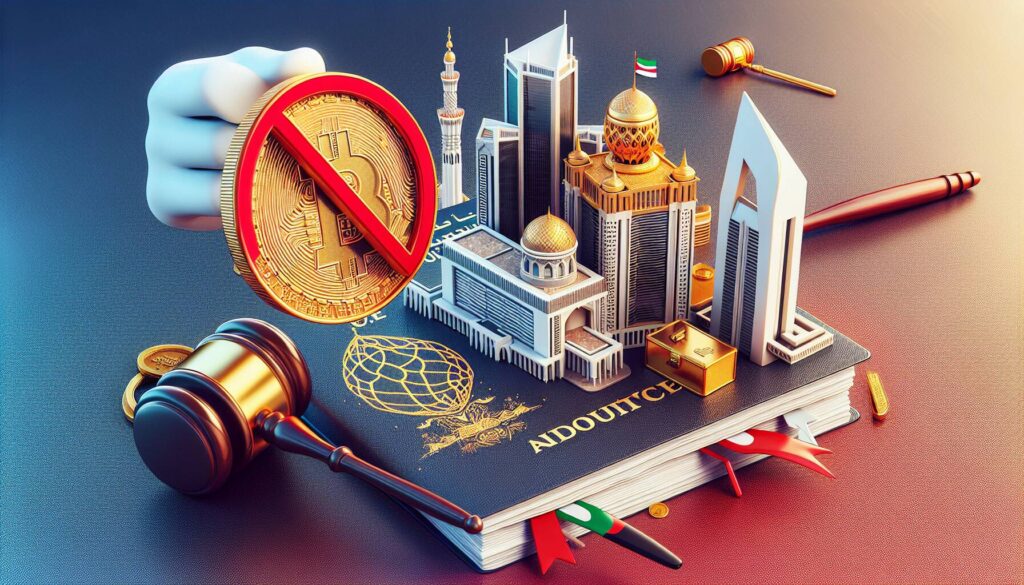In a surprising twist in the cryptocurrency world, authorities in the United Arab Emirates (UAE) have emphatically dismissed claims that individuals could secure the highly coveted Golden Visa by staking Toncoin (TON). This response came from key regulatory bodies, including the Federal Authority for Identity, Citizenship, Customs and Port Security (ICP), the Securities and Commodities Authority (SCA), and the Virtual Assets Regulatory Authority (VARA) of Dubai.
On Monday, these agencies issued a detailed statement categorically denying the existence of any such arrangement. They clarified that the existing frameworks for the Golden Visa do not currently encompass investors in digital currencies. Moreover, VARA underlined that Toncoin does not hold the necessary licenses or regulatory approval required to be considered in this context.
The controversy ignited over the weekend when Max Crown, CEO of the TON Foundation—an organization managing the popular Telegram-based crypto ecosystem—took to social media platform X to announce that Toncoin holders could acquire the prestigious visa by staking $100,000 worth of TON for three years, along with a processing fee of $35,000. Following his proclamation, the price of TON surged by an impressive 12%, reaching nearly $2.9, capturing the attention of investors and onlookers alike.
This incident raises eyebrows not only within the crypto community but also highlights ongoing discussions around regulation and legitimacy in the rapidly evolving digital currency landscape. Back in May, Telegram founder Pavel Durov hinted at a partnership with Elon Musk’s artificial intelligence venture, xAI, a deal that has yet to be finalized. As the cryptocurrency narrative unfolds, both excitement and skepticism continue to permeate discussions surrounding Toncoin and the broader market.

UAE Authorities Deny Golden Visa Acquisition via Toncoin
Key points about the recent statements from UAE authorities regarding the Golden Visa and Toncoin:
- Official Denial: UAE authorities, including ICP, SCA, and VARA, have strongly denied reports that Toncoin can be used to obtain the Golden Visa.
- Visa Framework: The current Golden Visa framework does not accommodate digital currency investors.
- Toncoin Status: VARA has confirmed that Toncoin is neither licensed nor regulated within the UAE.
- Controversial Claim: Max Crown, CEO of the TON Foundation, claimed that staking Toncoin could lead to acquiring a Golden Visa.
- Market Impact: Following Crown’s statement, Toncoin saw a 12% price surge, reaching nearly $2.9.
- Partnership Speculations: Telegram’s potential partnership with Elon Musk’s xAI has stirred speculation in the crypto community.
The rejection of the Golden Visa claims emphasizes the regulatory clarity needed in the cryptocurrency sector, potentially affecting investor confidence and market volatility.
UAE’s Rejection of Golden Visa for Toncoin: Implications and Insights
The recent announcement from UAE authorities dismissing the prospect of acquiring the Golden Visa through Toncoin staking highlights a significant regulatory stance in the evolving cryptocurrency landscape. This firm denial comes from key institutions, including the Federal Authority for Identity, Citizenship, Customs and Port Security (ICP) and the Virtual Assets Regulatory Authority (VARA), emphasizing the lack of regulatory approval for Toncoin. This decision contrasts with the increasing trend of countries exploring innovative pathways to attract crypto investments through visa incentives.
Advantages: UAE’s rejection can serve to bolster its reputation for stringent regulatory measures, which may instill confidence among traditional investors wary of market volatility and potential scams. Additionally, this stance could solidify trust within the local crypto ecosystem by clarifying the boundaries of acceptable crypto activities and protecting investors from misleading claims. Countries promoting crypto investment for residency might view this resolute approach as a disadvantage, as they could lose potential investors looking for safer alternatives.
Disadvantages: On the flip side, the decision might deter forward-thinking investors who are keen on innovative financial options like crypto staking. It could hinder the growth of a potentially burgeoning sector that could diversify UAE’s investment landscape and attract tech-savvy entrepreneurs. Furthermore, the rejection may create tensions with the Toncoin community, which had envisioned significant benefits in aligning their crypto activities with residency incentives. The aftermath could lead businesses and investors to reevaluate their strategies regarding UAE as a cryptocurrency-friendly destination.
Investors and crypto enthusiasts may find the situation unsettling, especially those who were speculating on the Golden Visa’s potential through TON as a pathway to gain residency. Those who focus on traditional investment avenues might benefit from this clarity, while crypto proponents might face challenges in navigating regulatory environments. Ultimately, this episode emphasizes the necessity for transparent communication between crypto projects and regulatory bodies to foster a thriving investment climate.

















